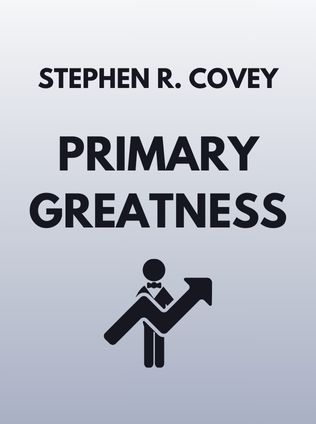
Primary Greatness
The 12 Levers of Success
By Stephen R. Covey
Published 11/2015
About the Author
Stephen R. Covey (1932-2012) was a renowned leadership authority, family expert, teacher, organizational consultant, and author. He dedicated his life to teaching principle-centered living and leadership to build both families and organizations. Covey authored several acclaimed books, including the international bestseller The 7 Habits of Highly Effective People, named the #1 Most Influential Business Book of the 20th century and one of the top-10 most influential management books ever. His posthumous work, Primary Greatness: The 12 Levers of Success, continues his legacy by exploring the principles of primary greatness, emphasizing character and integrity over external achievements.
Main Idea
Stephen R. Covey believed in the distinction between primary greatness and secondary greatness. Primary greatness is rooted in character and the intrinsic values of integrity, responsibility, and meaningful contribution. In contrast, secondary greatness is associated with external achievements such as money, popularity, and status. Covey posits that true success and fulfillment come from living a life of primary greatness, governed by universal principles. Primary Greatness: The 12 Levers of Success outlines these principles, providing a roadmap to achieving a life of true greatness.
Table of Contents
- Integrity
- Contribution
- Priority
- Sacrifice
- Service
- Responsibility
- Loyalty
- Reciprocity
- Diversity
- Learning
- Renewal
- Teaching
Integrity
Integrity is the cornerstone of primary greatness. It involves aligning our actions with our values and principles. Covey describes integrity as a balance of humility and courage, allowing us to remain true to ourselves even in the face of external pressures.
"Integrity means that your life is integrated around principles and that your security comes from within, not from without." - Stephen R. Covey
integrity in action include:
- Being honest in all dealings, even when it is difficult.
- Maintaining consistency between words and actions.
- Standing up for what is right, even when it is unpopular.
Contribution
Primary greatness is achieved by those who seek to contribute beyond themselves. This involves asking profound questions like, "What does the world need from me?" and "How can I contribute to the lives of others?" Covey emphasizes that true fulfillment comes from making a positive impact on the world.
"Primary greatness is achieved by those who have a mission, a purpose to serve that is higher than themselves, a lasting contribution to make." - Stephen R. Covey
Ways to contribute include:
- Volunteering time and resources to help others.
- Mentoring and guiding others in their personal and professional growth.
- Using one's talents and skills to address societal needs.
Priority
Shifting from secondary to primary greatness involves recognizing and prioritizing what truly matters. Covey suggests that our unique talents and responsibilities should guide our priorities, ensuring that we focus on what is genuinely important rather than what is merely urgent.
"What are the first things in your life? Your unique talents and capabilities determine the important work you have to do in life." - Stephen R. Covey
Setting priorities can be achieved by:
- Identifying and focusing on one's unique strengths and capabilities.
- Balancing personal and professional responsibilities effectively.
- Aligning daily activities with long-term goals and values.
Sacrifice
Sacrifice is a fundamental principle of primary greatness. It involves putting the needs of others before our own and working together towards common goals. Covey highlights the importance of humility and collaboration in achieving true greatness.
"To sacrifice means to revere. You can't bond with an entity — a family, a team, a company — you can only bond with people." - Stephen R. Covey
Acts of sacrifice include:
Sign up for FREE and get access to 1,400+ books summaries.
You May Also Like
The Subtle Art of Not Giving a F*ck
A Counterintuitive Approach to Living a Good Life
By Mark MansonRich Dad Poor Dad
What the Rich Teach Their Kids About Money - That the Poor and Middle Class Do Not!
By Robert T. KiyosakiHow To Win Friends and Influence People
The All-Time Classic Manual Of People Skills
By Dale CarnegieQuiet: The Power of Introverts
The Power of Introverts in a World That Can't Stop Talking
By Susan Cain



















